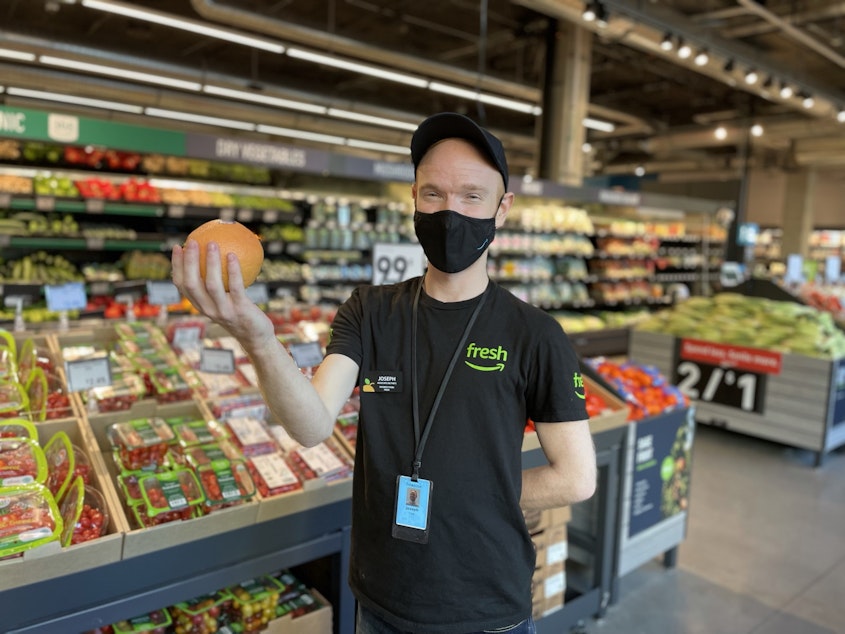Why is it so hard to unionize Amazon?

It’s been a year since the first-ever successful union election at an Amazon facility, a milestone many believed would herald a labor movement at the Seattle-based tech giant.
But rather than igniting a blaze of unionization, the labor movement at Amazon may be sputtering out. The Amazon Labor Union, which formed at a warehouse in New York City, has failed to secure a contract with Amazon amid reports of internal turmoil.
The ALU also hasn’t managed to unionize any additional warehouses despite setting out to do so.
Efforts to unionize facilities in Amazon’s home state of Washington, where labor is relatively strong, provide a glimpse into the uphill battle organizers face at the company.
Joseph Fink is one of those organizers. They asked a simple question on many minds in the labor movement: “Why is it so hard to organize a union at Amazon?”
Until last summer, Fink worked at an Amazon Fresh grocery store in Seattle’s Central District. Workers at the store took an unorthodox path to forming a union during the height of the pandemic. The union established itself informally rather than holding an election, which would entitle it to represent workers at the bargaining table and collect dues.
Sponsored
Fink distributed informational materials at the Amazon Fresh break room to notify coworkers of their right to organize, which they say sparked retaliation from managers. Fink filed a complaint with the National Labor Relations Board claiming Amazon verbally disciplined and surveilled them, before removing the union authorization cards from the break room.
“It's really painful to have your rights violated in a professional working environment,” Fink said. “It’s especially painful in that space because the law is very clear, and neither myself, nor my coworkers, broke the law.”
Amazon denies it has ever retaliated against workers for supporting unionization. Mary Kate Paradis, a spokesperson for the company, said Amazon supports its employees through “safety programs, wages, healthcare benefits that start on the first day of the job, free college tuition, and numerous upskilling programs.”
“We also know that there are outside organizations working hard and spending heavily to spread false information about us to our teams,” Paradis said in a statement to KUOW. “So — like many other companies — we also work to ensure our employees are fully informed about their rights and how decisions about outside representation could impact their day-to-day lives working at Amazon.”
Like the Amazon Fresh employees, organizers in New York chose to go it alone rather than enlisting support from an established national union. At the time, critics said the move exposed the Amazon Labor Union to greater risk of retaliation and stonewalling from the company.
Sponsored
But ALU organizers said their independence was one reason they succeeded where others failed. ALU co-founder Jordan Flowers said he doesn’t think joining a larger union would help make inroads with Amazon.
“I still wouldn’t think so, just for the simple fact that they don’t want a union at all,” he said.
Like Fink, Flowers said Amazon tried to prevent workers from organizing on company property.
“They’d still rather spend money and union bust and keep us in court and try to keep us away from organizing inside the building,” Flowers said.
In January, a federal judge found Amazon violated labor law when battling the union at the New York warehouse.
Sponsored
“We strongly disagree with these allegations,” Paradis said. “Our employees have the choice of whether or not to join a union and we don’t retaliate against employees for exercising their rights. As a company, we don’t think unions are the best answer for our employees. Our focus remains on working directly with our team to continue making Amazon a great place to work.”
After its surprise victory, the Amazon Labor Union set out to write a playbook for other warehouses across the country to follow. It inspired Amazon employee Eli Zingg to launch a union campaign at a warehouse in Washington state, as The Seattle Times and others reported last summer. That effort has apparently ended. The website and social media pages associated with the union campaign have gone dark and KUOW could not reach Zingg to comment.
More traditional paths to unionization have also led to dead ends at Amazon. Amazon defeated the Retail, Wholesale and Department Store Union in elections held at a warehouse in Bessemer, Alabama, despite support from President Joe Biden and other high-profile leaders. The union disputes those results and filed objections with the NLRB, which are still being adjudicated. The labor board authorized a second election after finding Amazon improperly interfered in the first. The final outcome has yet to be determined.
Amazon spent more than $14.2 million last year on anti-union consultants, according to a recent filing with the Labor Department. It was a nearly $10 million increase in spending from 2021, the Huffington Post reports.
It’s unclear whether Amazon’s efforts to fight unionization, the unorthodox approach some organizers are taking, or other factors are causing the labor movement to stall while campaigns at other large companies take off. But activists at the Seattle Amazon Fresh store and New York warehouse remain committed to recruiting new Amazon facilities to the cause.
Sponsored
“We are in it to win it,” Fink said. “We are in this struggle to build a better world. We believe in a world where all working people, and all people, can be complete, healthy, equal members of society. That starts with the ability to walk into the break room and place a few union authorization cards on the table without fear of being surveilled … and disciplined for doing so.”
Editor's note: This story has been updated to more accurately describe the labor dispute in Bessemer, Alabama.




